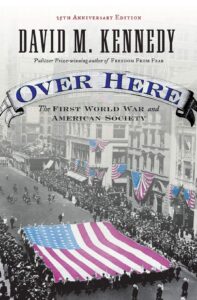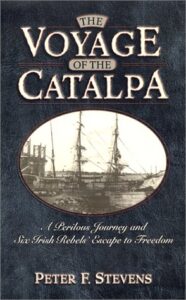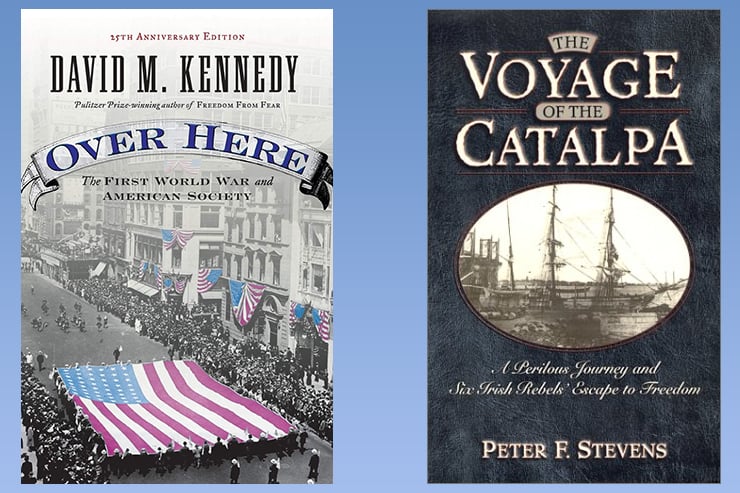
Serious readers often ask me for American history book recommendations. I reflexively suggest the 10-volume Oxford History of the United States. Oxford’s expansive narrative uses prominent historians to chronologically explain the American story. Four volumes have won Pulitzers, and another won a Bancroft. Stanford’s David Kennedy took over as the series’ editor after the death of C. Vann Woodward, who launched the project in 1982. Kennedy’s 1999 contribution to the collection, Freedom From Fear, ranks as one of the best accounts of America during the Great Depression and World War II. Oxford picked the right scholar to fill Woodward’s giant shoes.
Kennedy had his own brush with literary fame even before Oxford’s launch. His 1981 history of America during WWI, Over Here, was a Pulitzer finalist. The book details how America girded itself not just for European battlefields—the doughboys story Americans learn as schoolchildren—but, more importantly, “for many battles on the homefront.” Kennedy analyzes Americans’ bitter domestic fight “for the character of American economic, social, and political life.” Wars on the American homefront haven’t received their proper historical treatment, but Kennedy’s seminal work begins to fill that void.
WWI struck most Americans as “peculiarly an affair of the mind,” long before liberal interventionists pathologized any such patriotic distancing as “isolationism.” Therefore, Woodrow Wilson spent the early war years determined to gin up “the deliberate mobilization of emotions and ideas.” He enlisted a “fast-talking army of patriotic speechifiers,” the 75,000 strong Four-Minute Men, to push the war “before any available audience.” In the process, German-Americans found themselves cast as subversives. A Wyoming crowd lynched one who had publicly praised the Kaiser. To prove their patriotic chops, the mob lowered him to kneel and kiss the American flag before he eventually died. The Washington Post praised such atrocities as “a healthful and wholesome awakening in the interior of the country.” A New Hampshire court handed down a three-year prison sentence to one dissenter who dismissed Wilson’s agenda as “a Morgan war and not a war of the people.”
The federal draft agency pandered to Americans’ identity as “an exceptionally altruistic nation” by including “service” in its name. Wilson confiscated German patents along with German ships docked at American ports. Contrary to his 1917 “Peace Without Victory” speech, Wilson sailed to the Paris Peace Conference aboard one of the confiscated ships, “armed with as many weapons as my pockets will hold,” he bragged to his cabinet, “to compel justice.”
—John Greenville

Many books written in the United States about Ireland are long on sentiment and short on reality. Peter Stevens’s book, however, is a real and exciting history. The Voyage of the Catalpa describes a significant historical event from an era when the Irish in America contributed greatly to an independent Ireland.
In the 1840s, America saw a huge influx of Irish immigrants. Many Irish were bilingual, with Gaelic as their first language, but their familiarity with the English language and institutions enabled them to rise quickly in American politics. As they became more prominent in public affairs, their calls to end British rule in Ireland increased. Various groups formed and dedicated themselves to this goal, the Fenians being the most notable. These men of remarkable determination and gifted political ability founded a great academy of worldwide revolutionary conspiracy. So sophisticated were they that in Ireland, they successfully infiltrated the British military and other areas of British authority. Thousands of Irish recruits wore Her Majesty’s uniform but were secret members of the Fenian organization.
Many were arrested by the British in 1866, after a botched uprising, and sentenced to life imprisonment in Australia. Among these was John Boyle O’Reilly. After a three-year imprisonment, O’Reilly escaped with the help of Father McCabe, an Irish priest, who paid O’Reilly’s passage on a New Bedford whaler. O’Reilly landed in Boston and subsequently became the editor of the once-substantial newspaper, The Boston Pilot. But he never forgot his fellow prisoners left in Australia, and in 1876, the Fenians decided to do something about it.
The Catalpa was an American whaling vessel that the Fenians bought for their unique expedition. They would hunt not only whales for profit but other game as well. For this secret year-long expedition to Australia, the Fenians hired a whaling man, Captain George Anthony, an honest and upright New Bedford Yankee. The plan: Captain Anthony would handle the ship and the whaling aspect of the journey while the Irish would conspire to free the prisoners in Australia. The twists and turns of this endeavor (lifted to an art form) make for an extraordinary story of courage and intelligence—a real-life thriller.
Stevens has written a fine book that offers a profound understanding of why so many Irish ballads sing the praises of the “bold Fenian men.”
—Patrick J. Walsh

Leave a Reply